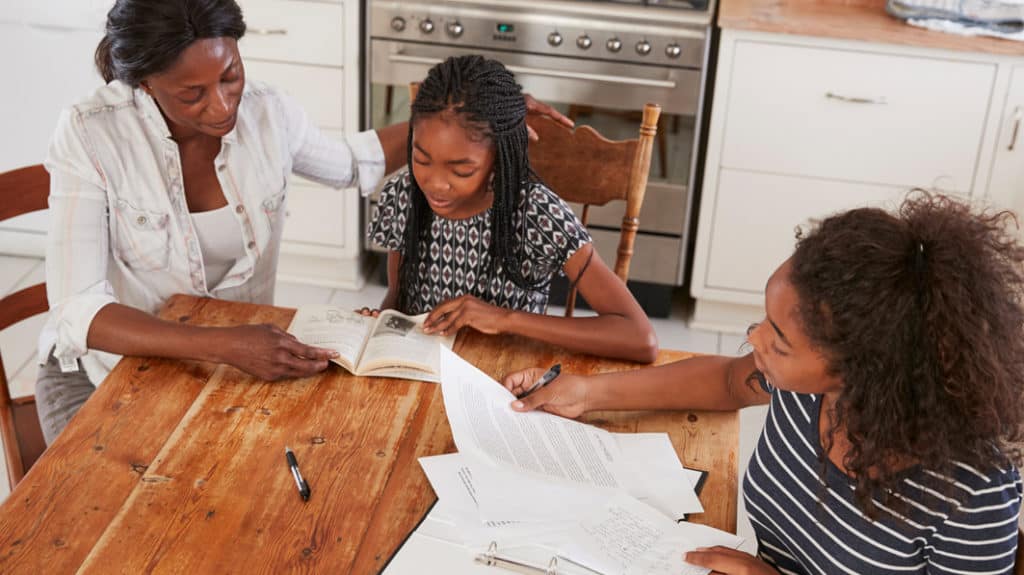
What Is Homeschooling? Is It Right for Me?
Let’s be honest: Homeschooling isn’t for everyone. Here is a look at what homeschooling is, and several ways to determine if it’s best for your family.

Given up on the idea of home education? It might be time to reconsider.
When her marriage ended and she became a single parent, Mary Jo Tate, a home-schooling mother from Tupelo, Miss., faced an unusual dilemma. Could she continue educating her four sons at home as a single mom? Most would answer no, but the freelance editor and book coach immediately said yes.
“I never considered stopping,” Tate says. “I trusted that God would provide the way to continue educating my children at home.”
Seem impossible? While the words single parent and home schooling seem incompatible, a small but growing segment of the U.S. home-schooling population finds itself in this situation. Brian D. Ray, president of the National Home Education Research Institute, estimates there could be as many as 185,000 single-parent home-school families in America today.
Single parents home school with the same motives as their two-parent counterparts, Ray says. “In home-based education, parents may offer better academic options, stronger parent-child relationships and customized individual education plans [to their children]. These reasons apply to single-parent families, too.”
There may be additional benefits to keeping children at home following a divorce or parental death, Ray says. Some parents find that home schooling provides continuity that other educational options often cannot. Andrea La-Rosa, a Web developer from Miami and creator of singleparenthomeschool.com, agrees that the need for continuity after major life changes is a prime reason for single-parent home schooling.
“A single parent who home schools can be there for [her] children in a way that most single parents can’t be,” she says. “It’s a way to keep families more intact, minimize the damage of a broken home and reclaim the positions of primary caregiver and guide in children’s lives — things many single parents often count as losses.”
But what about working single parents? Some, like Tate and La-Rosa, work from home. Others receive sufficient alimony, child support or life insurance payments, but most spouseless moms and dads work full-time, outside-the-home jobs to make ends meet. Can a single parent with a 9-to-5 job still teach her child at home?
Don’t rule it out, La-Rosa says. Many single home-schooling parents enlist friends or family with child care and academic assistance. Others swap tutoring services within their home-schooling community or leave homework assignments to be completed during the workday and hold classes in the evenings.
“It’s important to remember that your home school doesn’t have to look like anyone else’s,” she says. “Get out of the mind-set of what should work. What does work for you and your children is what counts.”
Most single parents withstand inner doubts about their parenting abilities already, and single-parent home schooling might only compound these worries. But Brian D. Ray offers reassurance to anyone doubting the validity of this educational path.
“When a child is home-educated, regardless of having a single parent or two, the child does as well academically, socially, emotionally and psychologically as other students,” Ray says. “Study after study shows that home schoolers outperform those in public school and [do] at least as well as private school students. This fact remains the same for single-parent and two-parent families.”
However, if a single parent tries home schooling and finds it too taxing, there are options beyond giving up entirely. La-Rosa urges home-schooling single parents to avoid self-imposed isolation.
“Knowing when and how to ask for necessary help is crucial for the success of single-parent home schooling,” she says. “If you no longer want to home school, by all means put your kids back in school. But if you want to continue yet feel as though it’s too challenging, reach out to your family, neighbors, fellow home-schooling families and church.”
Tate and La-Rosa are confident that acceptance for single-parent home schooling will grow over time, but cultural approval isn’t what motivates them. Rather, it is the knowledge of eternally impacting their children by making the best choice for their families.
Though many have found great success as single-parent educators, the choice to teach children at home remains difficult. Single-parent home schooling isn’t for everybody, but single mothers and fathers should not rule out home education simply because of their marital status. They can always look to the greatest Teacher for guidance on shaping their children’s education and future.